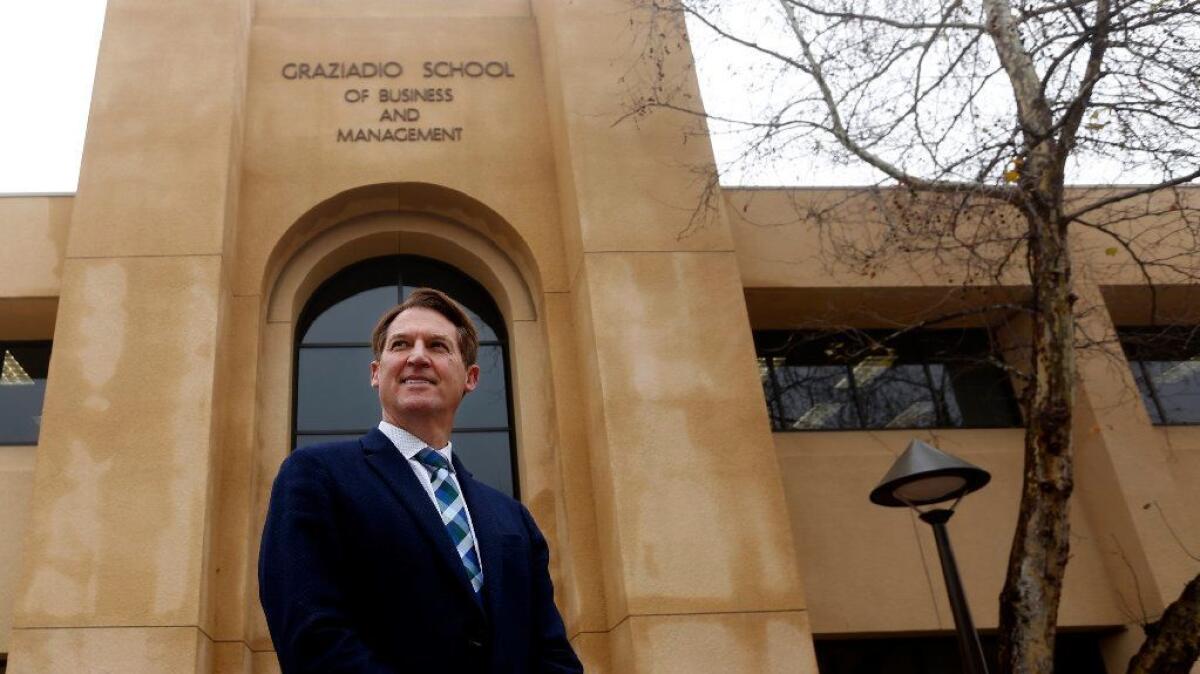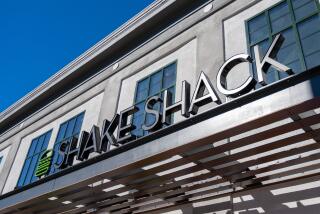He’s looking for the secret recipe to educate business leaders

- Share via
The gig: Deryck van Rensburg is the new dean of Pepperdine University’s Graziadio School of Business and Management in Malibu. He took over in November after spending 32 years in international business with consumer-products giant Unilever and then Coca-Cola Co. His task: To reinvigorate the business school’s vision and strategy.
Early years: Van Rensburg, 57, was born and raised in South Africa when apartheid reigned. His father worked for the railroads and “my mother left me when I was four, she walked out,” he said. “It was complicated.” He eventually served his mandatory two years in the South African military.
Needed change: After getting a bachelor’s degree in commerce, van Rensburg joined Unilever in its brand-management unit, married and then moved to England for postgraduate studies in part because “being Christian I really struggled with the whole situation with apartheid,” he said. “We decided to find our footing elsewhere.”
Lasting impression: Van Rensburg earned an MBA and the equivalent of a doctorate in England, then rejoined Unilever as a marketing manager in London. A few years later, a search firm hired by Coca-Cola came calling and van Rensburg moved to the Atlanta beverage giant. But van Rensburg never forgot the effect some professors had on him. “I said, ‘That’s what I want to do one day,’” he recalled.
Far-flung posts: With Coke, van Rensburg took turns heading operations in Austria, Romania, Greece and Germany. He often consolidated Coke’s bottlers and made other sweeping changes to increase efficiency and boost sales. He also learned a key part of Coke’s culture: That it’s crucial for executives to visit stores where Coke is sold and talk to customers. “They had this fundamental belief that you immerse yourself at the street level,” he said.
Riding a wave: By 2007, van Rensburg was back working in Coke’s Atlanta headquarters. His oldest son, a surfer, was looking for U.S. colleges near the ocean and picked Pepperdine. “He’s to blame actually, or to thank” for leading van Rensburg to the school, the father said with a laugh. Another son attended Pepperdine as well, so van Rensburg bought a house in Malibu and came to know the school’s senior administrators.
Opportunity knocks: One day a Pepperdine vice chancellor came through Atlanta, met with van Rensburg and asked if he’d consider becoming the business school’s new dean. “I’d always had this desire to develop myself and challenge myself intellectually, and [the offer] just came at the right time,” he said. The job also came with a spectacular view of the Pacific Ocean from the dean’s office on the hillside campus.
The challenge: “You’ve got a good school, we’re having good momentum and we have our highest enrollment in 12 years” with 500 full-time students and 1,500 part-time and executive students, he said. “But it’s been a little while since we really got clear about who do we really want to be and how do we want to be distinguished?”
Setting goals: Van Rensburg has launched a program to figure out the school’s vision and strategy, and he expects to produce a plan for both in the fall. The process has included talking to the faculty, alumni, students and staff, all with the goals of making “the student experience transformational,” spreading the word that Pepperdine stands apart and creating “leaders of the future,” he said. Also, “it’s incumbent on us to get the very best students in the door.” Before taking the job, van Rensburg also spoke with the deans of 26 other business schools to get their input.
Watch the fringes: “When you’re in a large company you typically benchmark yourself against your principal competitor,” van Rensburg said. But in his last job at Coke, running a business unit that identifies and develops independent brands with big sales potential, “what we found was, disruption comes from all kinds of places and typically from the fringe of the industry.” That “peripheral vision” needed in the corporate world also applies to academia, he said. “I believe higher education potentially will undergo disruption. I bring that perspective of always looking at the fringe of the industry, what are some of the technologies or trends that could impact what we do today?”
Off the clock: Van Rensburg and his wife, Rozanne, have three sons and a daughter. International travel is still part of van Rensburg’s life. He and his family recently went to Kenya to visit one of seven children in Africa they sponsor through Compassion International, and other recent travels took them to Israel and the Galapagos Islands. They’ll also return to South Africa this year for a family reunion.
Twitter: @PeltzLATimes
More to Read
Inside the business of entertainment
The Wide Shot brings you news, analysis and insights on everything from streaming wars to production — and what it all means for the future.
You may occasionally receive promotional content from the Los Angeles Times.










